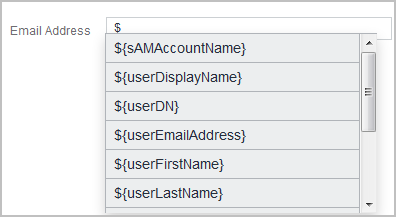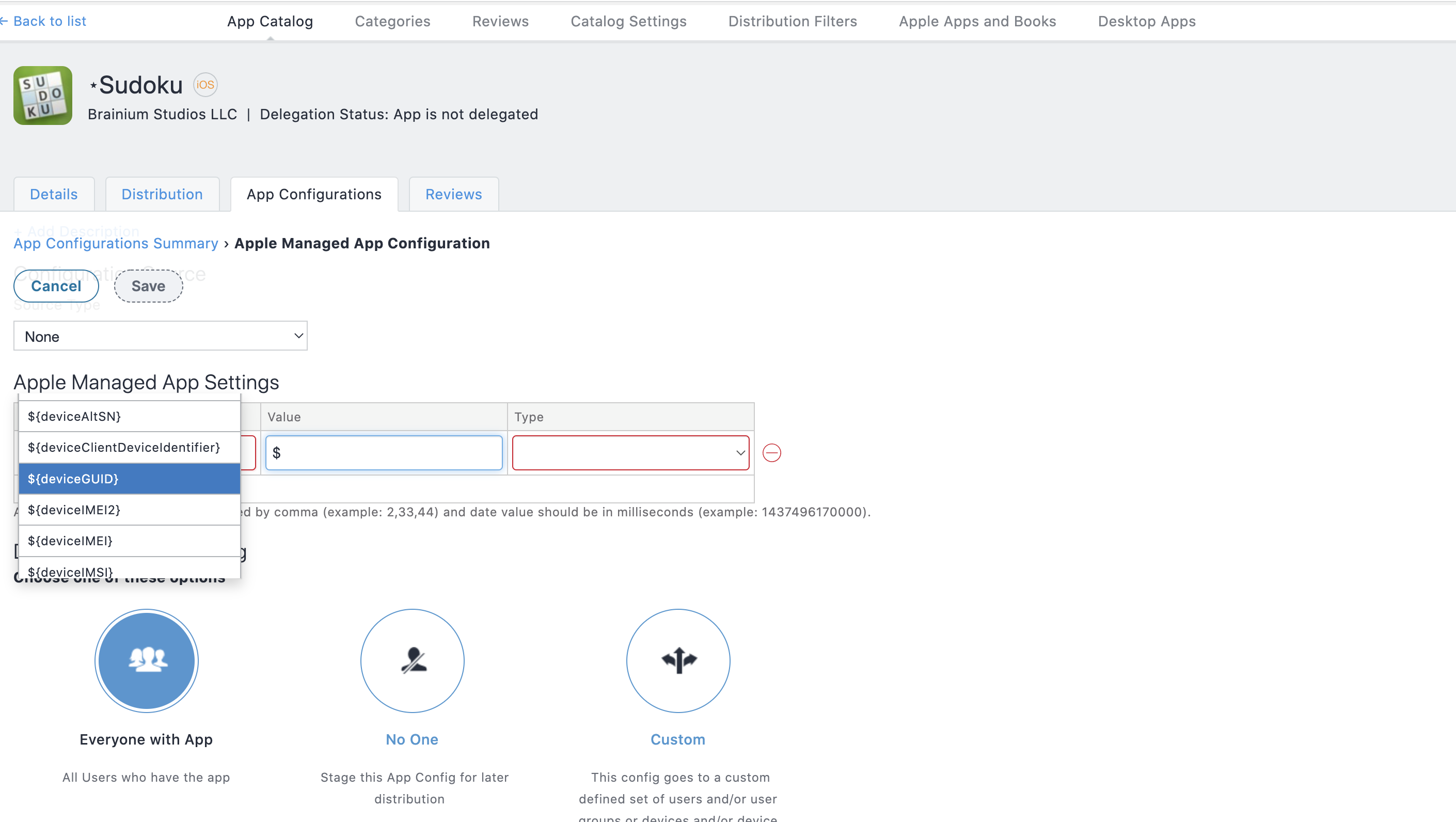Variables
You can use variables in certain configuration fields to represent values specific to a given user. Any field that supports variables displays a list of supported variables if you type $ in the field. This section contains the following topics:
Supported user account variables
User Variables

|
Variable key |
Value description |
|---|---|
| ${department} | department attribute (requires Azure Active Directory) |
| ${edipi} | No Description |
| ${managedAppleId} | User's Managed Apple ID |
| ${sAMAccountName} | sAMAccountName attribute (requires Active Directory) |
| ${userCN} | Common Name (CN) attribute extracted from the distinguished name (requires LDAP) |
| ${userDisplayName} | Display name |
| ${userDN} | Distinguished Name (requires LDAP) |
| ${userEmailAddressDomain} | The domain part of the email address (part after '@') |
| ${userEmailAddressLocalPart}> | The local part of the email address (part before '@') |
|
${userEmailAddress} |
Email address |
| ${userFirstName} | First name |
| ${userLastName} | Last name |
| ${userLocale} | Locale |
| ${userOU} | Organizational Unit (OU) attribute extracted from the distinguished name (requires LDAP) |
| ${userREALM} | Kerberos Realm information (requires Active Directory) |
| ${userUIDDomain} | The domain part of the login ID (the part after '@') |
| ${userUIDLocalPart} | The local part of the login ID (the part before '@') |
| ${userUID} | Login ID (email address format) |
| ${userUPN} | userPrincipalName attribute (requires Active Directory) |
Supported device variables
Use device variables to specify information about a mobile device.
Device Variables

|
Variable key |
Value description |
|---|---|
| ${clientLastCheckin} | Date client last checked-in (most recent checkin - either MDM or Client) |
| ${deviceAltSN} | Alternative Serial Number |
| ${deviceClientDeviceIdentifier} | Identifier used by the client application |
| ${deviceGUID} | Globally unique device identifier |
| ${deviceIccIdentifier} | No Description |
| ${deviceIMEI2} | IMEI2 |
| ${deviceIMEI} | IMEI |
| ${deviceIMSI} | IMSI |
| ${deviceLastCheckin} | Date device last checked-in (most recent checkin - either MDM or Client) |
| ${deviceMdmChannelId} | Internal device identifier |
| ${deviceMdmDeviceIdentifier} | Identifier used for MDM |
| ${deviceMEIdentifier} | No Description |
| ${deviceModel} | Model |
| ${deviceName} | Device name |
| ${devicePhoneNumber} | Device phone number |
| ${devicePK} | Cluster unique device identifier |
| ${deviceSN} | Serial Number |
| ${deviceUDID} | iOS UDID |
| ${deviceWifiMacAddress} | Wi-Fi MAC Address |
Email template variables
|
Variable key |
Value description |
|---|---|
| ${policyMessageContent} | No Description |
| ${policyMessageTitle} | No Description |
Time stamp variables
|
Variable key |
Value description |
|---|---|
| ${timestampMS} | Current timestamp (milliseconds since the epoch) |
Policy template variables
|
Variable key |
Value description |
|---|---|
| ${nameOfPolicy} | Policy name violated |
| ${nextAction} | Next Tiered Compliance Action (different than wait and retire) to be taken after send message |
| ${nonComplianceTime} | Count of days device has been in non-compliant state |
| ${policyViolationFirstTime} | Time stamp when policy violation was first triggered (UTC DD-MM-YYYY format) |
| ${ruleConditions} | Rule definition (query string the way it appears now) |
Related topics: